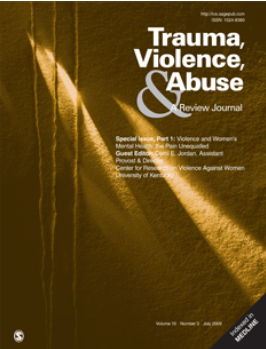Mental and Physical Health Correlates for Sexual Intimate Partner Violence Perpetration and Victimization: A Meta-Analysis
IF 5.4
1区 社会学
Q1 CRIMINOLOGY & PENOLOGY
引用次数: 0
Abstract
Sexual intimate partner violence (IPV) is a serious, often overlooked, public health concern. Research examining correlates of sexual IPV perpetration and victimization is warranted to help assessment and intervention efforts. This study utilized the biopsychosocial model as a theoretical framework, highlighting the importance of examining mental and physical health correlates for sexual IPV. This meta-analysis used data from 168 articles, yielding 352 unique effect sizes, to calculate aggregate effect sizes for mental and physical health correlates for sexual IPV victimization and perpetration among men and women. We also examined whether correlates were stronger for men or women, as well as whether they were more strongly related to perpetration or victimization. Results found that some of the strongest correlates for sexual IPV victimization were suicidal ideation, post-traumatic stress, anxiety, and depression. The strongest correlates for sexual IPV perpetration were narcissistic personality disorder, psychopathy, and alcohol use. Several lesser-examined correlates for women-only samples were identified, such as dissociation, schizophrenia, somatic symptoms, and insomnia. There were no significant differences in the strength of correlates between men and women, although only five correlates were able to be compared. It was also found that post-traumatic stress was a stronger correlate for sexual IPV victimization than perpetration, and alcohol use was a stronger correlate for sexual IPV perpetration than victimization. Research and clinical implications are discussed.心理和身体健康与性亲密伴侣暴力行为和受害相关:一项荟萃分析
性亲密伴侣暴力(IPV)是一个严重的、往往被忽视的公共卫生问题。研究调查性IPV犯罪和受害的相关性是必要的,以帮助评估和干预工作。本研究利用生物心理社会模型作为理论框架,强调了检查性IPV的心理和身体健康相关性的重要性。这项荟萃分析使用了来自168篇文章的数据,产生了352个独特的效应量,以计算男性和女性之间性IPV受害和犯罪的心理和身体健康相关的总效应量。我们还研究了相关性对男性还是女性更强,以及它们与犯罪或受害的关系是否更强。结果发现,自杀意念、创伤后压力、焦虑和抑郁与性暴力受害的关系最为密切。与性IPV犯罪最相关的是自恋型人格障碍、精神病和酗酒。确定了仅针对女性样本的几个较少检查的相关因素,如分离、精神分裂症、躯体症状和失眠。尽管只有5个相关因素可以进行比较,但男性和女性之间相关因素的强度没有显著差异。研究还发现,创伤后应激与性暴力侵害的相关性比犯罪行为强,酒精使用与性暴力侵害的相关性比犯罪行为强。讨论了研究和临床意义。
本文章由计算机程序翻译,如有差异,请以英文原文为准。
求助全文
约1分钟内获得全文
求助全文
来源期刊

Trauma Violence & Abuse
Multiple-
CiteScore
13.60
自引率
7.80%
发文量
131
期刊介绍:
Trauma, Violence, & Abuse is devoted to organizing, synthesizing, and expanding knowledge on all force of trauma, abuse, and violence. This peer-reviewed journal is practitioner oriented and will publish only reviews of research, conceptual or theoretical articles, and law review articles. Trauma, Violence, & Abuse is dedicated to professionals and advanced students in clinical training who work with any form of trauma, abuse, and violence. It is intended to compile knowledge that clearly affects practice, policy, and research.
 求助内容:
求助内容: 应助结果提醒方式:
应助结果提醒方式:


